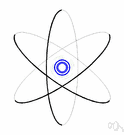monad
Also found in: Thesaurus, Medical, Encyclopedia, Wikipedia.
mo·nad
(mō′năd′)n.
1. Philosophy An indivisible, impenetrable unit of substance viewed as the basic constituent element of physical reality in the metaphysics of Leibniz.
2. Biology A single-celled microorganism, especially a flagellate protozoan formerly classified in the taxonomic group Monadina.
mo·nad′ic (mə-năd′ĭk), mo·nad′i·cal adj.
mo·nad′i·cal·ly adv.
mo′nad·ism n.
American Heritage® Dictionary of the English Language, Fifth Edition. Copyright © 2016 by Houghton Mifflin Harcourt Publishing Company. Published by Houghton Mifflin Harcourt Publishing Company. All rights reserved.
monad
(ˈmɒnæd; ˈməʊ-)npl -ads or -ades (-əˌdiːz)
Also called (for senses 1, 2): monas 1. (Philosophy) philosophy
a. any fundamental singular metaphysical entity, esp if autonomous
b. (in the metaphysics of Leibnitz) a simple indestructible nonspatial element regarded as the unit of which reality consists
c. (in the pantheistic philosophy of Giordano Bruno) a fundamental metaphysical unit that is spatially extended and psychically aware
2. (Biology) a single-celled organism, esp a flagellate protozoan
3. (Chemistry) an atom, ion, or radical with a valency of one
[C17: from Late Latin monas, from Greek: unit, from monos alone]
moˈnadical adj
moˈnadically adv
Collins English Dictionary – Complete and Unabridged, 12th Edition 2014 © HarperCollins Publishers 1991, 1994, 1998, 2000, 2003, 2006, 2007, 2009, 2011, 2014
mon•ad
(ˈmɒn æd, ˈmoʊ næd)n.
1. a flagellated protozoan, esp. of the genus Monas.
2. an element, atom, or group having a valence of one.
3. Philos. an indivisible metaphysical entity, esp. one having an autonomous life.
4. a single unit or entity.
mo•nad•ic (məˈnæd ɪk) mo•nad′i•cal, mo•nad′al, adj.
Random House Kernerman Webster's College Dictionary, © 2010 K Dictionaries Ltd. Copyright 2005, 1997, 1991 by Random House, Inc. All rights reserved.
monad
any simple, single-cell organism. — monadic, monadical, monadal, adj.
See also: Cells-Ologies & -Isms. Copyright 2008 The Gale Group, Inc. All rights reserved.
monad
Spritual individuality that is reincarnated.
Dictionary of Unfamiliar Words by Diagram Group Copyright © 2008 by Diagram Visual Information Limited
ThesaurusAntonymsRelated WordsSynonymsLegend:
Switch to new thesaurus
| Noun | 1. |  monad - (chemistry) an atom having a valence of one monad - (chemistry) an atom having a valence of onechemical science, chemistry - the science of matter; the branch of the natural sciences dealing with the composition of substances and their properties and reactions atom - (physics and chemistry) the smallest component of an element having the chemical properties of the element |
| 2. |  monad - a singular metaphysical entity from which material properties are said to derive monad - a singular metaphysical entity from which material properties are said to derive | |
| 3. | monad - (biology) a single-celled microorganism (especially a flagellate protozoan) microorganism, micro-organism - any organism of microscopic size biological science, biology - the science that studies living organisms |
Based on WordNet 3.0, Farlex clipart collection. © 2003-2012 Princeton University, Farlex Inc.
Translations
Collins Spanish Dictionary - Complete and Unabridged 8th Edition 2005 © William Collins Sons & Co. Ltd. 1971, 1988 © HarperCollins Publishers 1992, 1993, 1996, 1997, 2000, 2003, 2005
monad
Collins German Dictionary – Complete and Unabridged 7th Edition 2005. © William Collins Sons & Co. Ltd. 1980 © HarperCollins Publishers 1991, 1997, 1999, 2004, 2005, 2007
Collins Italian Dictionary 1st Edition © HarperCollins Publishers 1995